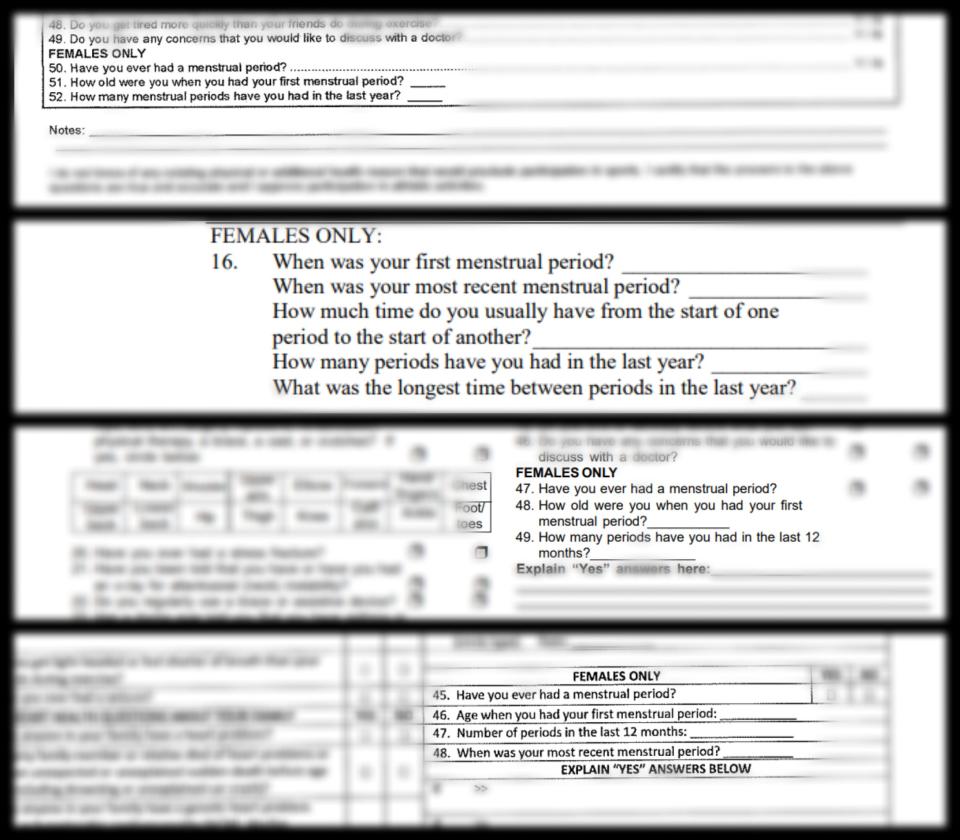Schools in New England ask athletes about menstrual history: Why it's being talked about
Last month, a panel of the Florida High School Athletic Association voted to reaffirm its recommendation that period history be collected from menstruating athletes in order for them to be eligible to participate in sports.
Florida isn't alone in the personal questions it asks students who want to play on a school team. The majority of states do the same, and have for decades. In New England, though not mandatory by any state for participation, it happens all over in a patchwork nature, an investigation by the USA TODAY Network shows.
On physical exam and sports eligibility forms, many high schools ask athletes questions about their most recent period and how many periods they've had in the last 12 months. Generally, the queries around menstrual history are meant to spur a conversation between a student and their doctor prior to sports participation. But a lion's share of schools have students turn the information in, or don't label what pieces should be left confidential with a doctor.
When was your last period?Florida, and many other states, ask student athletes about their periods. Why some find it 'shocking' post-Roe

The real topic of dispute is around where the information is going. In Florida, concerns have mounted around schools mandatorily collecting menstrual history because of how some districts are storing the information online, the Palm Beach Post recently reported. Parents, athletes and physicians criticized the state for digitizing reproductive history, specifically after the overturning of Roe v. Wade last June. Abortion and privacy rights activists fear it could be used in criminal prosecutions, as abortion in Florida is illegal after 15 weeks.
Many schools across New England are now using online sports registration platforms, such as FamilyID, FinalForms or FormRELeaf.
"In an era with a lot of policies surrounding access to reproductive health and gender-affirming care, my worry is some of this information could be used against a student," said Dr. Scott Hadland, chief of the children’s adolescent and young adult medicine department at Massachusetts General Hospital.
Latest news out of Florida:30 legislators call on FHSAA to scrap 'invasive' menstrual history questions

Medical experts: Why high school athletes may be asked about their menstrual history
Menstrual history can provide critical information about a person's health and overall wellness, experts say, but the point of contention is mainly about what's done with the data collection and who gets access to it.
Dr. Kathryn Ackerman, director of the Female Athlete Program at Boston Children's Hospital, said questions about menstrual history should be included on medical forms to help physicians evaluate patients. But there is "absolutely no reason" for an athletic director or school to know that "private medical information," she said.
"We deal with this at the very elite level right on down," Ackerman said. "We might be monitoring a student for something, but we don't need to share the details with a coach or school."

Variation in menstrual cycles can be very normal, and it can also be a "red flag" to something more serious going on, said Hadland.
Missed or irregular periods can mean someone is or was recently pregnant. Similar symptoms can also indicate a group of disorders called the female athlete triad, where low energy, eating disorders, irregular periods and anemia can signal low bone density. Period problems can mean polycystic ovarian syndrome, too.
Access to pads and tampons:Period products aren't free or accessible in schools. Students want to make that happen.
But Hadland and Ackerman are both of the mindset that this information is best discussed and shared confidentially with a doctor, not a school or sports team.
"My strong recommendation is that it would be done with a physician with appropriate evaluation and testing as needed," said Hadland. "Questions surrounding menstrual history are immensely personal and also they're difficult to interpret. I'm doubtful most people interpreting this form would know what to do with that information."
For example, Hadland said, someone could check a box indicating shortness of breath. It could mean severe asthma, or it could mean something more benign like being "out of shape." Either way, it would "illicit a further conversation and testing with a physician."

Individual athletic trainers or directors might offer different perspectives. According to reporting by the Palm Beach Post, Michele Benz, head athletic trainer at Miami Palmetto Senior High School in Pinecrest, Florida, said she relies heavily on the forms to take care of her student-athletes.
"I pull physical forms all the time when I have patients who are coming in," she said. "Taking this information out of my hands is putting my patients, student-athletes, at risk."
Tom Kozikowski, athletic director at Portsmouth High School in Portsmouth, New Hampshire, said he requested questions about menstrual history be taken off the school's eligibility forms when he took over the job two years ago.
"I am a parent of two daughters as well and ... thought it was odd myself," he said. "We did request the question to be taken off of our registration, which is currently where it stands."
Menstrual history and concerns around data privacy, surveillance
Ackerman cited the U.S. Supreme Court's overturning of Roe v. Wade as interfering with the advancement of science for women and girls. She noted concerns around data privacy when it comes to period tracking apps, for example.
In 2019, the U.S. women's national soccer team used breakthrough period tracking to help players' performances at the World Cup. Ackerman said the sports medicine field wants to continue studying that.
"So the last thing we want to do is make young girls nervous to talk about it," she said.
Rebecca Hart Holder, president of Reproductive Equity Now, a Massachusetts-based nonprofit working for safe and accessible reproductive health care, shares concerns about menstrual data being digitized outside of medical practices.
"In a post-Roe America and in this age of digital surveillance, any kind of menstrual data reporting poses a serious threat to personal privacy and bodily autonomy," she said. "Even in a state like Massachusetts, where reproductive health care is protected, we must do everything we can to protect our personal privacy and medical health records from surveillance."
Here's what the American Academy of Pediatrics recommends
After reviewing practices in all six states, the USA TODAY Network found there isn't a uniform way high schools in New England are collecting student-athlete health data, something that rings true nationally.
State high school athletic associations may circulate a pre-participation or physical examination form — oftentimes the forms created by the American Academy of Pediatrics — but they have no jurisdiction over what individual school districts ultimately decide to use and what they do with the information.
One of the American Academy of Pediatrics forms does ask about menstrual history, but that section is explicitly labeled as one that should not be turned in to schools or sports organizations.
What Massachusetts high schools are asking on their sports forms
The Massachusetts Interscholastic Athletic Association works with schools to ensure all student-athletes have an updated physical every 13 months in order to play sports, in accordance with state Department of Public Health guidelines. MIAA does not, however, control how schools ask student-athletes to submit this information, said assistant executive director Steve Dubzinski.
A look at various school district websites and the MIAA's own website shows forms that ask about menstrual history with no direction of where the information should be going. Many feature a "females only" section with questions about menstrual history, while others include a "yes or no" question about menstrual problems. Some have a section for a physician to make notes about "genitalia."
During the fall of 2022, MIAA's Sports Medicine Committee voted unanimously to recommend use of the American Academy of Pediatrics forms, said Dubzinski. Updating the MIAA handbook to reflect the recent recommendation and communicating the guidance to schools is in process, he added.
Still, the final decision is left up to individual school districts.
Athletes, abortion, anxiety:Women’s professional sports grapple with eroding rights
What New Hampshire high schools are asking on their sports forms
The New Hampshire Interscholastic Athletic Association said it does not collect any information about menstrual history. Per its bylaws, a "medical statement" from a physician certifying the student has passed a pre-participation physical examination prior to participating in athletics must be on file with the school.
But NIHAA's sports medicine bylaws state that "local school districts may impose requirements that exceed the provisions of this bylaw," meaning individual schools can require information on forms above and beyond what the NHIAA recommends.
'Invest in women': Female athletes changing landscape on ownership in professional sports
What Connecticut high schools are asking on their sports forms
Following an inquiry by the USA TODAY Network into a form that asked three questions about menstrual history, the Connecticut Interscholastic Athletic Conference removed it from its website and replaced it with an updated form.
CIAC's John Holt said the older form was an example they provided to schools but was not the most updated form in circulation — one that does not include any questions about menstrual history.
Holt said Connecticut schools "can and widely do" use their own forms. He confirmed CIAC does not approve or review individual school forms.
The form taken down off the CIAC website asked the following questions:
Have you ever had a menstrual period?
How old were you when you had your first menstrual period?
How many periods have you had in the last 12 months?
Rhode Island and Vermont ask for physician sign-off only
Rhode Island and Vermont are among only a handful of states where athletes turn in just a physician's sign-off clearing them to play.
The Rhode Island Interscholastic League explicitly labels which parts of their recommended forms are to be turned in to the school district. One piece of the form is to be filled out and discussed between the student and their physician, ultimately to be kept on file with the physician, and the second is to be filled out by the physician for the school district. The first form asks about menstrual history, while the second does not.

In Vermont, "no questions regarding menstrual history are asked by schools as a condition to participate in sports," said Jay Nichols, executive director of the Vermont Principals' Association.
The form circulated by the Vermont Principals' Association reads clearly at the top: "This clearance form is the only Sports Participation Clearance Form supported by the Vermont Principals' Association, the Vermont Departments of Health and Education, and the Vermont Chapters of the American Academy of Pediatrics and the American Academy of Family Physicians. The American Academy of Pediatrics Council on Sports Medicine and Fitness developed the research based screening activities done during a Well Exam, to determine sports readiness."
It asks for "relevant information for coaches and the athletic department," such as allergies, asthma, diabetes and seizures.
What Maine high schools are asking on their sports forms
The Maine Principals' Association's recommended form explicitly tells students and their families which parts are for use exclusively with a doctor and which should be turned in to the sports team.
But that messaging isn't being portrayed everywhere. A browse of forms available online shows many Maine high schools don't include that explanation anywhere on their forms, many of which currently ask students about their menstrual history in various ways. This can often lead to students accidentally turning in personal health history to the wrong place.
"I am sure that happens frequently," said Michael Burnham, executive director of the Maine Principals' Association interscholastic division. "It is the responsibility of the coach or (athletic director) to get the information to the correct person."
The MPA does ask students to turn their menstrual history in to the school nurse as featured on the American Academy of Pediatrics form, Burnham said, as part of their "confidential health record."
Palm Beach Post reporter Kati Kokal contributed to this story.
This article originally appeared on USA TODAY NETWORK: High school student-athletes asked about periods across New England

